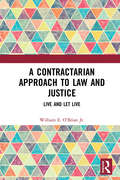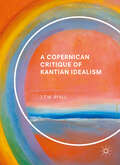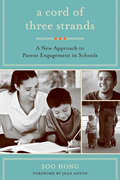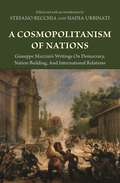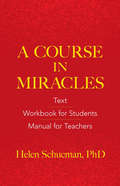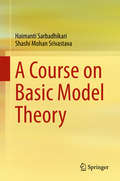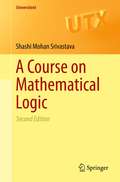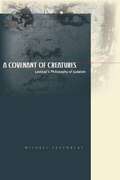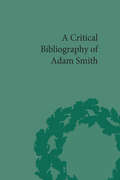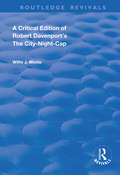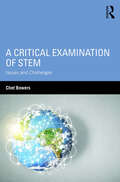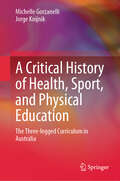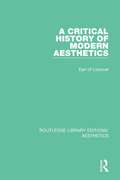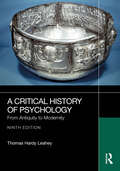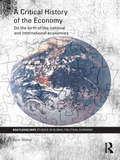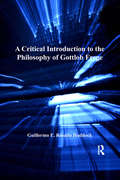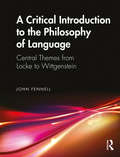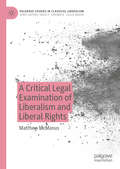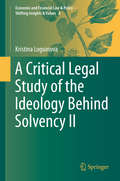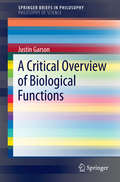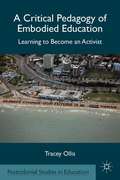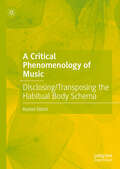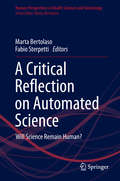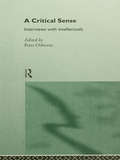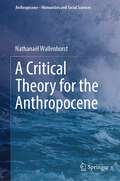- Table View
- List View
A Contractarian Approach to Law and Justice: Live and Let Live
by William E. O’Brian Jr.This book presents a distinctive version of a contractarian approach to law and justice. The work argues that law and justice are social norms that arise from a process of social evolution, and are binding only if and to the extent that they are mutually beneficial. It explicitly rejects accounts of law and justice that are based on morality, on the basis that morality itself is only legitimately founded on mutual advantage. But it also rejects most existing versions of contractarianism, which are based on ideas of hypothetical agreements by rational contractors, in favour of an approach that is based on actually existing social norms, but advocates critically examining these norms and discarding those that are not truly mutually beneficial. The first half of the book develops the approach, while the second half explores some of its implications for law. It argues for a left-libertarian approach to property, an approach largely based on the common law of tort, contract and criminal law, and a rejection of most statutory law, which is based not on mutual advantage but rather on benefiting some at the expense of others. However, it ultimately recognises that there are those who want a more extensive state than this approach allows, and advocates a strong form of federalism to allow this, provided robust exit rights are provided. The book combines political philosophy, economics and law into an approach that is broadly libertarian but distinctive in many respects. It will be of interest to scholars in all three of those disciplines.
A Copernican Critique of Kantian Idealism
by J. T. W. RyallThis book offers a comprehensive critique of the Kantian principle that 'objects conform to our cognition' from the perspective of a Copernican world-view which stands diametrically opposed to Kant's because founded on the principle that our cognition conforms to objects. Concerning both Kant's ontological denial in respect of space and time and his equivalence thesis in respect of 'experience' and 'objectivity', Ryall argues that Kant's transcendental idealism signally fails to account for the one thing that is essential for Copernicus and the only thing that would validate a comparison between his and Kant's critical philosophy, namely the subject as 'revolving object'. It is only by presupposing - in a transcendentally realistic sense - that human beings exist as physical things in themselves, therefore, that the 'observer motion' of Copernican theory is vindicated and the distorted nature of our empirical observations explained. In broadly accessible prose and by directly challenging the arguments of many stalwart defenders of Kant including Norman Kemp Smith, Henry E. Allison and Michael Friedman, Ryall's book will be of interest to both scholars and students of Kant's philosophy alike.
A Cord of Three Strands: A New Approach to Parent Engagement in Schools
by Soo HongHow can low-income, non-English-speaking parents become advocates, leaders, and role models in their children&’s schools? A Cord of Three Strands offers a close study of the Logan Square Neighborhood Association, a grassroots organization on the northwest side of Chicago, whose work on parent engagement has drawn national attention. The author identifies three elements—induction, integration, and investment—that together capture the dynamic and developmental nature of successful parent engagement. Writing with both optimism and urgency, author Soo Hong offers richly detailed portraits of parents&’ experiences and addresses the complex and sometime conflicting relationships among school, family, and community.
A Cosmopolitanism of Nations: Giuseppe Mazzini's Writings on Democracy, Nation Building, and International Relations
by Giuseppe MazziniThis anthology gathers Giuseppe Mazzini's most important essays on democracy, nation building, and international relations, including some that have never before been translated into English. These neglected writings remind us why Mazzini was one of the most influential political thinkers of the nineteenth century--and why there is still great benefit to be derived from a careful analysis of what he had to say. Mazzini (1805-1872) is best known today as the inspirational leader of the Italian Risorgimento. But, as this book demonstrates, he also made a vital contribution to the development of modern democratic and liberal internationalist thought. In fact, Stefano Recchia and Nadia Urbinati make the case that Mazzini ought to be recognized as the founding figure of what has come to be known as liberal Wilsonianism. The writings collected here show how Mazzini developed a sophisticated theory of democratic nation building--one that illustrates why democracy cannot be successfully imposed through military intervention from the outside. He also speculated, much more explicitly than Immanuel Kant, about how popular participation and self-rule within independent nation-states might result in lasting peace among democracies. In short, Mazzini believed that universal aspirations toward human freedom, equality, and international peace could best be realized through independent nation-states with homegrown democratic institutions. He thus envisioned what one might today call a genuine cosmopolitanism of nations.
A Course in Miracles: Text, Workbook for Students, Manual for Teachers
by Helen Schucman PhDA Course in Miracles is the acclaimed spiritual guide that teaches the way to universal love and peace is by undoing guilt through forgiving others. The "miracles" of the title refers to shifts in perception from fear to love, which fosters the healing and sanctification of relationships. Although expressed in terms of traditional Christianity, this life-changing work constitutes nonsectarian, universal spiritual teachings.The three-part approach begins with an explanation of the course's theory and the development of the experience of forgiveness. The second consists of a workbook, comprising 365 lessons — an exercise for each day of the year — intended to influence students' perceptions. The third section presents a manual for teachers, in which the question-and-answer format provides responses for likely inquiries as well as definitions for terms used throughout the course. Written by Dr. Helen Schucman, a clinical and research psychologist, and edited by her colleague at Columbia University, Dr. William Thetford, from 1965 to 1970, A Course in Miracles has been translated into more than 20 languages and sold millions of copies around the world.
A Course on Basic Model Theory
by Shashi Mohan Srivastava Haimanti SarbadhikariThis self-contained book is an exposition of the fundamental ideas of model theory. It presents the necessary background from logic, set theory and other topics of mathematics. Only some degree of mathematical maturity and willingness to assimilate ideas from diverse areas are required. The book can be used for both teaching and self-study, ideally over two semesters. It is primarily aimed at graduate students in mathematical logic who want to specialise in model theory. However, the first two chapters constitute the first introduction to the subject and can be covered in one-semester course to senior undergraduate students in mathematical logic. The book is also suitable for researchers who wish to use model theory in their work.
A Course on Mathematical Logic (Universitext)
by Shashi Mohan SrivastavaThis is a short, modern, and motivated introduction to mathematical logic for upper undergraduate and beginning graduate students in mathematics and computer science. Any mathematician who is interested in getting acquainted with logic and would like to learn Gödel's incompleteness theorems should find this book particularly useful. The treatment is thoroughly mathematical and prepares students to branch out in several areas of mathematics related to foundations and computability, such as logic, axiomatic set theory, model theory, recursion theory, and computability. In this new edition, many small and large changes have been made throughout the text. The main purpose of this new edition is to provide a healthy first introduction to model theory, which is a very important branch of logic. Topics in the new chapter include ultraproduct of models, elimination of quantifiers, types, applications of types to model theory, and applications to algebra, number theory and geometry. Some proofs, such as the proof of the very important completeness theorem, have been completely rewritten in a more clear and concise manner. The new edition also introduces new topics, such as the notion of elementary class of structures, elementary diagrams, partial elementary maps, homogeneous structures, definability, and many more.
A Covenant of Creatures: Levinas's Philosophy of Judaism
by Michael Fagenblat"I am not a particularly Jewish thinker," said Emmanuel Levinas, "I am just a thinker." This book argues against the idea, affirmed by Levinas himself, that Totality and Infinity and Otherwise Than Being separate philosophy from Judaism. By reading Levinas's philosophical works through the prism of Judaic texts and ideas, Michael Fagenblat argues that what Levinas called "ethics" is as much a hermeneutical product wrought from the Judaic heritage as a series of phenomenological observations. Decoding the Levinas's philosophy of Judaism within a Heideggerian and Pauline framework, Fagenblat uses biblical, rabbinic, and Maimonidean texts to provide sustained interpretations of the philosopher's work. Ultimately he calls for a reconsideration of the relation between tradition and philosophy, and of the meaning of faith after the death of epistemology.
A Critical Bibliography of Adam Smith
by Hiroshi MizutaThis critical bibliography of Adam Smith takes as its starting point the Kress Library of Business and Economics’ 1939 catalogue of its Vanderblue Collection of Smithiana. Since the bicentenary of The Wealth of Nations in 1976, the rate of international publication markedly accelerated, significantly extending the scope of this bibliography beyond 1939. Its scope has been further enlarged via the inclusion of essays on the diffusion process while the inclusion of all works in the chronological main bibliography gives an overview of the scope of this process. The notes appended to the entries provide a running commentary to the gathering pace of publication and the entries are organised chronologically with systematic annotation throughout.
A Critical Edition of Robert Davenport's The City Night-Cap (Routledge Revivals)
by Robert DavenportOriginally published in 1979, this volume includes the full, edited, 1661 play of Robert Davenport, 'The City Night-Cap', alongside textual notes, including an introduction on the man and his works, theatrical history, characterization, theme and structure, and setting.
A Critical Examination of STEM: Issues and Challenges (Sociocultural, Political, and Historical Studies in Education)
by Chet BowersThis critical examination of STEM discourses highlights the imperative to think about educational reforms within the diverse cultural contexts of ongoing environmental and technologically driven changes. Chet Bowers illuminates how the dominant myths of Western science promote false promises of what science can achieve. Examples demonstrate how the various science disciplines and their shared ideology largely fail to address the ways metaphorically layered language influences taken-for-granted patterns of thinking and the role this plays in colonizing other cultures, thus maintaining the myth that scientific inquiry is objective and free of cultural influences. Guidelines and questions are included to engage STEM students in becoming explicitly aware of these issues and the challenges they pose.
A Critical History of Health, Sport, and Physical Education: The Three-legged Curriculum in Australia
by Jorge Knijnik Michelle GorzanelliThis book fills a gap in literature by generating a combined history of Physical Education (PE), School Sport (SS) and Health Education (HE) in New South Wales (NSW) public schools from 1880 to 2024. It includes broad discussions on how political issues such as the World Wars influenced (i) the PE curriculum, which was used as a medium to prepare a &‘fit&’ army, (ii) the school sport system, which acted as an expression of national strength via showcasing sporting prowess on the international stages of the Olympic Games, and (iii) the health education curriculum, which addressed infectious diseases resulting from poor hygiene associated with poverty. The book also adopts a socio-cultural perspective to the constructs of PE, SS, and HE curricula and highlights significant local, national, and international historical events and issues as factors driving curriculum developments and paradigm shifts in these subjects in the NSW public education and beyond. It brings new and engendering socio-historical findings to the discipline fields of PE, SS, and HE, combined with an innovative methodology in critical historiographical studies.
A Critical History of Modern Aesthetics (Routledge Library Editions: Aesthetics #3)
by Earl of ListowelFirst published in 1933. The purpose of this work was to bridge a gap in English philosophical literature by completing the elaborate history of Bosanquet and to stimulate and enrich the whole study of aesthetics by means of his personal destructive and constructive criticism. This title will be of interest to students of philosophy.
A Critical History of Psychology: From Antiquity to Modernity
by Thomas Hardy LeaheyThis fully updated and refreshed 9th edition places social, economic and political forces of change alongside psychology’s internal theoretical and empirical arguments. It utilizes a critical lens to illuminate the way in which the external world has shaped the development of psychology and, in turn, how psychology from antiquity to modernity has shaped society.The text approaches the material from an integrative, rather than wholly linear, perspective, carefully examining how issues in psychology reflect and affect concepts that lie outside the field of psychology’s technical concerns as a science and profession.Key features of this edition include: A newly reconsidered structure, including five additional interludes exploring historical background narratives and the rise of modernity, to allow for flexible and adaptable textbook use. Expanded exploration of the two psychologies: the Way of Ideas, driven by epistemology and unique to Europe, and The Way of Human Nature, a universal concern to find a science of human behavior and its management. Including scientific, applied, and professional psychology, as well as coverage of the social sciences and social policy implications, this book is appropriate for high-level undergraduate and graduate students.
A Critical History of the Economy: On the birth of the national and international economies (RIPE Series in Global Political Economy)
by Ryan WalterDrawing on recent debates in critical International Political Economy, this book mobilizes the idea that the economy does not exist separately from society and politics to develop a detailed intellectual history of how the economy came to be seen as an independent domain. In contrast to typical approaches to writing the history of economic thought, which assume the reality of the economy, the author describes the forms of intellectual argument that made it possible to conceive of the national and international economies as objects of intellectual inquiry. At the centre of this process was the analytical separation of power and wealth. Walter thus offers a broad historical perspective on the emergence of current IPE theory, while linking the field with contextualist intellectual history. This important and innovative volume will be of strong interest to students and scholars of International Political Economy, International Relations, Economics, History and Political Theory.
A Critical Introduction to the Philosophy of Gottlob Frege
by Guillermo E. HaddockGottlob Frege is one of the greatest logicians ever and also a philosopher of great significance. In this book Rosado Haddock offers a critical presentation of the main topics of Frege's philosophy, including, among others, his philosophy of arithmetic, his sense-referent distinction, his distinction between function and object, and his criticisms of formalism and psychologism. More than just an introduction to Frege's philosophy this book is also a highly critical and mature assessment of it as a whole in which the limitations, confusions and other weaknesses of Frege's thought are closely examined. The author is also a Husserlian scholar and this book contains valuable discussions of Husserl's neglected views and comparisons between the two great philosophers.
A Critical Introduction to the Philosophy of Language: Central Themes from Locke to Wittgenstein
by John FennellA Critical Introduction to Philosophy of Language is a historically oriented introduction to the central themes in philosophy of language. Its narrative arc covers Locke’s ‘idea’ theory, Mill’s empiricist account of math and logic, Frege and Russell’s development of modern logic and its subsequent deployment in their pioneering program of ‘logical analysis’, Ayer and Carnap’s logical positivism, Quine’s critique of logical positivism and elaboration of a naturalist-behaviorist approach to meaning, and later-Wittgenstein’s ‘ordinary language philosophy’-inspired rejection of the project of logical analysis. Thus, it historically situates the two central programs in early twentieth-century English-speaking philosophy -- logical analysis and logical positivism -- and discusses the central critiques they face later in the century in the works of Quine and the later-Wittgenstein. Unlike other secondary studies in philosophy of language, A Critical Introduction to Philosophy of Language is not just a ‘greatest hits album’, i.e., a discontinuous compilation in which classics in the field are presented together with their standard criticisms one after the other. Instead, Fennell develops a particular, historical-thematic narrative in which the figures and ideas he treats are introduced in highly intentional ways. And by cross-referencing them throughout his discussions, he highlights the contributions they make to the narrative they comprise.
A Critical Legal Examination of Liberalism and Liberal Rights (Palgrave Studies in Classical Liberalism)
by Matthew McManusThis book has two aims. First, to provide a critical legal examination of the liberal state and liberal rights in the law, and secondly, to present a systematic alternative to liberal approaches to both the law and rights, grounded in a left wing conception of human dignity. At the opening of the 21st century a remarkable thing happened. Liberalism, once considered the only doctrine left standing at the end of history, began to face renewed competition from both the political left and the post-modern conservative right. This book argues that the way forward is not to abandon, but to radicalize, the potential of the liberal project. Analysing major theoretical positions in order to build a critical genealogy of liberal rights, McManus lucidly develops a left wing alternative to the classic liberal approach to rights drawing on the traditions of liberal egalitarians and deliberative democracy theory. Societies, he argues, should be committed to advancing the human dignity of all through the enshrinement of certain rights into positive state law, the expansion of democracy and a resolute commitment to economic equality.
A Critical Legal Study of the Ideology Behind Solvency II (Economic and Financial Law & Policy – Shifting Insights & Values #4)
by Kristina LoguinovaThis book analyzes the impact of Solvency II. In recent years, EU legislators have sought to introduce fundamental reforms. Whether these reforms were indeed fundamental is critically investigated with regard to a post-crisis piece of financial legislation affecting the EU’s largest institutional investors: Solvency II. Namely, the last financial and economic crisis, the worst financial catastrophe of the last decade, revealed that financial law in particular was not sufficiently mature to maintain the existence of a robust and trust-worthy financial system that could protect society from economic decline. The work also makes concrete recommendations on achieving a more sustainable future. As such, it offers a valuable resource for anyone who is interested in the financial system, the EU political economy, insurance, sustainability, and Critical Legal Studies.
A Critical Overview of Biological Functions (SpringerBriefs in Philosophy)
by Justin GarsonThis book is a critical survey of and guidebook to the literature on biological functions. It ties in with current debates and developments, and at the same time, it looks back on the state of discourse in naturalized teleology prior to the 1970s. It also presents three significant new proposals. First, it describes the generalized selected effects theory, which is one version of the selected effects theory, maintaining that the function of a trait consists in the activity that led to its differential persistence or reproduction in a population, and not merely its differential reproduction. Secondly, it advances "within-discipline pluralism" (as opposed to between-discipline pluralism) a new form of function pluralism, which emphasizes the coexistence of function concepts within diverse biological sub-disciplines. Lastly, it provides a critical assessment of recent alternatives to the selected effects theory of function, namely, the weak etiological theory and the systems-theoretic theory. The book argues that, to the extent that functions purport to offer causal explanations for the existence of a trait, there are no viable alternatives to the selected effects view. The debate about biological functions is still as relevant and important to biology and philosophy as it ever was. Recent controversies surrounding the ENCODE Project Consortium in genetics, the nature of psychiatric classification, and the value of ecological restoration, all point to the continuing relevance to biology of philosophical discussion about the nature of functions. In philosophy, ongoing debates about the nature of biological information, intentionality, health and disease, mechanism, and even biological trait classification, are closely related to debates about biological functions.
A Critical Pedagogy of Embodied Education
by Tracey OllisExplores the differences and similarities between two groups: lifelong activists who have been engaged in campaigns and socials movements over many years and circumstantial activists, those protestors who come to activism due to a series of life circumstances. Outlines the pedagogy of activism and the process of learning to become an activist.
A Critical Phenomenology of Music: Disclosing/Transposing the Habitual Body Schema
by Rachel ElliottDrawing a link between music and what Maurice Merleau-Ponty calls the habit body – a quasi-transcendental structure at the heart of our perceptual, social, and agential being – this book helps articulate why music has the power to express as well as shape our existence at a fundamental level. Using phenomenology, research in the cognitive sciences, and first-person descriptions of musical experiences, this book addresses topics such as the relationship of music to identity, the capacity of music to be personally and socially transformative, the role of music in our perception of others, the connection between music and trauma, and the possibility of engendering we-experiences through shared musical time.
A Critical Reflection on Automated Science: Will Science Remain Human? (Human Perspectives in Health Sciences and Technology #1)
by Marta Bertolaso Fabio SterpettiThis book provides a critical reflection on automated science and addresses the question whether the computational tools we developed in last decades are changing the way we humans do science. More concretely: Can machines replace scientists in crucial aspects of scientific practice? The contributors to this book re-think and refine some of the main concepts by which science is understood, drawing a fascinating picture of the developments we expect over the next decades of human-machine co-evolution. The volume covers examples from various fields and areas, such as molecular biology, climate modeling, clinical medicine, and artificial intelligence. The explosion of technological tools and drivers for scientific research calls for a renewed understanding of the human character of science. This book aims precisely to contribute to such a renewed understanding of science.
A Critical Sense: Interviews with Intellectuals
by Peter OsborneA Critical Sense brings together in a single volume the leading figures of contemporary radical theory. Moving freely between philosophy, politics and cultural studies, it offers a fascinating overview of the lines of thought of today's intellectual left.Marxism, feminism, psychoanalysis and critical theory, literary studies, deconstruction, pragmatism, postcolonial and queer theory are discussed in a series of interviews from the journal Radical Philosophy. Those interviewed are:Judith ButlerCornelius CastoriadisDrucilla CornellAxel HonnethIstvan MeszarosEdward SaidRenata SaleclGayatri Chakravorty SpivakCornel WestSlavoj ZizekFor those unfamiliar with the often daunting work of some of today's most important thinkers, ACritical Sense will offer an ideal introduction; for those already acquainted with the writings of the theorists interviewed here, the collection will throw new - and often surprising - light on familiar ground.
A Critical Theory for the Anthropocene (Anthropocene – Humanities and Social Sciences)
by Nathanaël WallenhorstThis volume, which is rooted in biogeophysical studies, addresses conceptions of political action in the Anthropocene and the tension between a desire to accomplish the Promethean project of modernity and a post-Promethean approach. This work explores the idea of an anthropological mutation of political consolidation from a “post-Promethean togetherness”, to creating the capacity to act together. The political thinking of the human condition developed by Hannah Arendt is important here as a resource for thinking about humanity in terms of human adventure. This has three dimensions: hubris, the world and coexistence referring respectively to the logic of profit of the homo oeconomicus, the logic of responsibility of the homo collectivus and the logic of the hospitality of the homo religatus. The intellectual and political attitude outlined in this book is an extension of critical theory: the work also puts forward a critique of what poses a problem in our relationship to the world and suggests how to overcome it, the ultimate goal being social transformation. The author propose an uprising and an anthropological consolidation of politics based on the revitalization that is brought about by the sharing of a conviviality both between humans and with what is non-human. The identification of conviviality as an educational paradigm to survive the Anthropocene gives us the much needed reason for hope despite this heritage of the Anthropocene. In addition to Arendtian thinking, this critical theory for the Anthropocene draws on the political thinking of several contemporary authors including Maurice Bellet, Hartmut Rosa, Andreas Weber, Dominique Bourg, and Christian Arnsperger. This volume is of interest to researchers in the Anthropocene.
